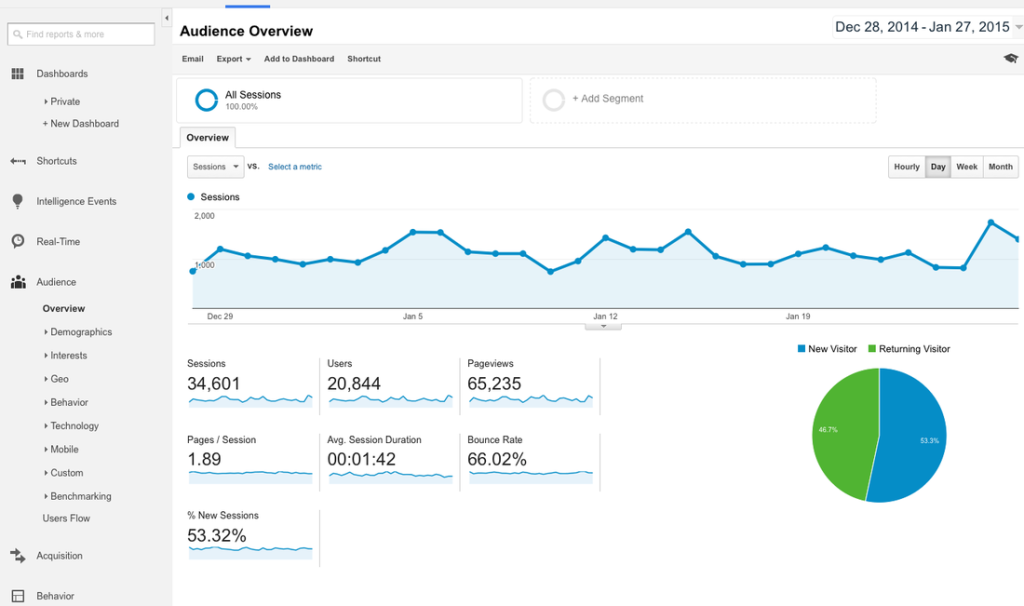This article is the first in the “Measuring Your Success with Online Marketing” series reviewing key marketing metrics for you online platforms (website, newsletters and social media) to gauge where you are, where you are going and how best to get you there.
How healthy is your website? If you have a blog, e-commerce and/or a contact form on your website, you might have a general sense of how active or engaged visitors are with your website. However, most people who basically use their website as an online marketing brochure (is this you?) don’t really have a sense of how well their website is performing and what they could do to improve its “health and vitality.”
To review the basic website metrics, you will need to have Google Analytics installed on you site, so that you can then log into the Google Analytics dashboard for your site (if you don’t know how to do this, ask your web developer or go here).
Now let’s dig in to the numbers – (which I recommend you do at least monthly) and understand what they mean.
Number of sessions – This is defined as each time a visitor initiates a session. Ideally, you would like to see this number grow each month or at least remain constant. Adding new, consistent and valuable content to your site on a frequent basis will help grow your audience. If there are big fluctuations from month to month, it is important to figure out what or who is helping to spike your traffic (see Referrals via Acquisition below).
Number of users – This is the number of visitors who are coming to your site for a specified period of time (by default 30 days). A 50/50 balance of new and returning visitors shows a healthy engagement with fans who are returning to learn more from you and a new audience who is interested to find out more.
** Note- Don’t get lost in the numbers and forget about engagement. It’s important to be consider quantity AND quality of your audience. For example, in trying to raise awareness for your site and business, you will be much better served by 500 enthusiastic visitors who return to your website on a regular basis, read your blog posts, leave comments, refer traffic and contact you, than you will by having 1,000 visitors who visit once and never come back. **
Time on site (Avg Session Duration) – Obviously, the more time spent on your site the better, but don’t forget we have short attention spans, so don’t be surprised to see an average of under 2 minutes. To get people to stay on your site, make it “sticky” by including easy navigation and discoverability throughout your site. In other words, make it easy for them to get wherever it is you want them to go on your site. Don’t lead them to dead ends.
Bounce rate – This percentage reflects how much of your audience is landing on your site and bouncing off quickly. Ideally you don’t want to see a bounce rate higher than 60%. If it is hovering closer to 45% or 50%, that’s better, but not ideal. Try to keep it trending downward using the same engaging tactics (mentioned above) for getting them to spend more time on your site.
Sources and referrals via the Acquisition Channel – Where is your traffic coming from? Are they coming by searching? Or via email? Or social media? Another website? Who is your top “referrer”? Be sure to be developing relationships (online and off) with your most valuable referral sources.
Most popular pages via the Behavior Channel – Once visitors are on your site, what do they do there? What page do they come to first, and then where to they go? Which are the most popular pages on your site for a given period? Is it your services, about, portfolio or do they head to the blog? Does this change or does is stay the same? Understanding your visitors’ behavior and interest will help you better update and refresh your site with content they are seeking.
In reviewing these key stats on a monthly basis, you will soon get a clear picture about how healthy and effective your website is. It will also give you valuable insight about how well your other online marketing efforts (social media, newsletters, online advertising, adwords, etc.) are performing.
Stay tuned for more about online marketing measurement and metrics, when we look at social media and email newsletter marketing in upcoming posts.
In the meantime, let me know in the comments, what did you learn or discover about the health of your website when you dug into Google Analytics. I look forward to hearing from you! Thanks.

